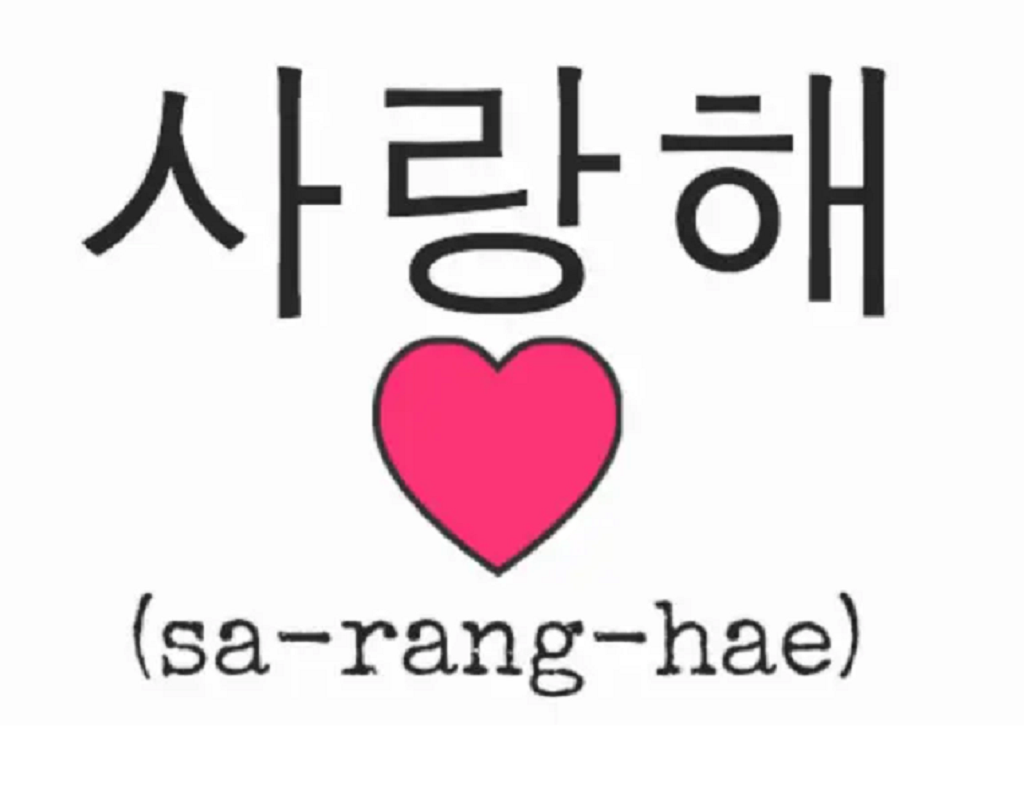Ever since Korean dramas have started gaining popularity all over the world, the internet pops up with Korean terms and phrases every now and then. Same is the reason for the popularity of the Korean term “SARANGHAE“. Since you are here in search of knowledge, our job is to fill you up everything that you need to know about this term. You will get to know all the possible meanings and uses of the term ‘saranghae’ in this article.
Pronunciation and Meaning:
It is pronounced as a three syllable word, the first word is SA, second is RANG and the third is GHAE. So the word goes as SA-RANG-HAE. The word saranghae is an informal way of saying “I LOVE YOU” and therefore it is generally used to say I love you to your close ones or preferably to the people who are of the same age as you.
Some more details about the word SARANGHAE:
The root word of the word saranghae is SARANG and then to be able to express it in an informal manner, we add the suffix ‘HAE’. And then we can also transform saranghae into SARANGHAEYO to make it more polite and respectful.
Now that we know that the meaning of the word saranghae is I love you, let’s take some examples to make it more clear. So, in English we say that, “Honey, I love you”, which can be translated into Korean as “Jagi, Saranghae” where Jagi is the Korean term for honey. Please take note that, since in this sentence you are addressing to your “honey” or your “jagi”, who is very close to you, you can freely use saranghae, which is an informal way of saying I Love You. But there are cases wherein you would want to say I love you or saranghae to the people that are older than you, like your parents, and that leads us to the second example, in English it says, “I love you, Mom”, this can be translated into Korean as, “Saranghaeyo, Eomma”, where Eomma is the Korean term for Mom. We know that the Korean translation of the term I love you is saranghae, but this time since you are addressing your mother, you should be using saranghaeyo, which is just the polite version of saranghae.
With that, you have now officially learned the term SARANGHAE and it’s uses.
Saranghae the brand:
Yes, saranghae is also the name of a South Korean skin care brand which has gained a lot of popularity in the last few years. The whole name of the company is “Saranghae Means I Love You”. This brand was launched in the year 2016 and it entirely focused on the North American consumers. However, today its products are available worldwide. Its founder and CEO is Peter Lee. Lee says that he got inspired by the beauty mixes and lotions that his mother made at home when he was a child. So he made this company to take the South Korean beauty secrets to every American household and now he has taken them to the world.
Saranghae the K-drama:
Yes, you read it right. Long before K-dramas were a thing, there was a K drama called Saranghae starring Ahn Jae Wook, Seo Ji Hye and Park Hye Young. This K-drama was based on the comic ‘Gaksital’ by Huh Young Man which was first published in 1974. The show aired from 7th April 2008 to 27th May 2008 on the broadcast network SBS. It was a romantic show about a couple with an age gap of 14 years who accidentally had a baby due to a one night stand. It showcased the modern generation’s perspective on love and also portrayed the hardships of raising a child. It’s very hard to find that show today on any streaming platform.
Songs:
Since the meaning of the word is I love you, it is impossible that there won’t be any songs by that name. The list of South Korean songs by the name of Saranghae is long, but the latest edition to the list is the song ‘saranghae’ by the band Treasure. The song was released 11th months ago and was an absolute hit. It has 75 million views on youtube. You can watch it on the YouTube channel of the band. Name of the channel is the same as that of the band only, Treasure.
Some more basic terminology that every K-drama and Kpop fan must know:
- Go-ma-wo: Thanks (informal).
- Kam-sa-ha-mida: Thank you (formal).
- Ommo Ommo: Surprised / shocked (expression).
- Hyojo: Break up.
- Dae-bak: Amazing.
- An-i-yo: No.
- Andwae: Not at all.
- Jae-bal: Please.
- Appo: Pain.
- Kye-op-ta: Cute.
- Chuk-ha-eyo: Congratulations!
- Kwenchana: It is okay.
- Hwaiting: You can do it! (Cheer up)
- Heol: surprised / shocked (expression).
- Kaija: Let’s go.
- Jo-a-hae: Liking something.
- Sirheo: I won’t / I don’t.
- Eot-toh-ke: What to do?
- Wae: why ?
- Jinja: Really ??
- Aigoo: Geez / oh no/ oops.
- Annyeong: Hello (informal).
- Annyeong-ha-seyo: Hello (formal).
- Palli: Fast.
- Mi-an-hae: I am sorry.
- Aishh: Said out of frustration or concern.
- Odi ga?: Where are you going?
- Igeo mwoya?: What is this?
- Molla: I don’t know.
- Yaksok: Promise.
- Don-obso: I don’t have money.
- Jal-ja: Sleep well.
- Bab-Mokja: Let’s go to eat.
- Arra-se-o: Okay.
- Mwo: What?
- Kaji-ma: Don’t go.
- Nugu: Who?
- Hai Chingu-deul: Hi Friends!
- Jam-kan-man: wait a minute.
- Pa-bo-ya: idiot.
- Bo Go-ship-da: I miss you.
- Jeong-mal: Really? (Doubt).
- Na Noel chao-yo: I like you.
- Oppa: Men older than you. (Word is used by females)
We hope that now your Korean vocabulary has become pretty decent and that you are now ready to show it off among your friends who are also fans of K-dramas and K pop.
